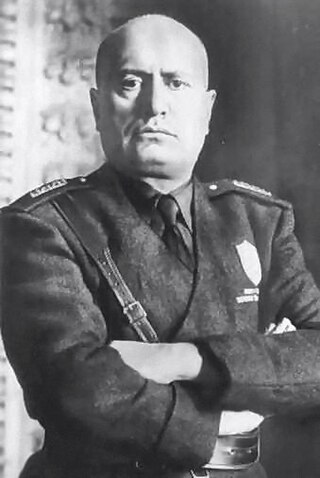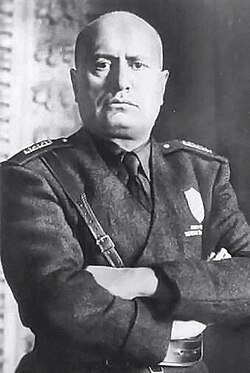Benito Mussolini
dictator of Italy from 1922 to 1945 From Wikipedia, the free encyclopedia
Remove ads
Benito Amilcare Andrea Mussolini (July 29, 1883 – April 28, 1945) was an Italian politician who was the dictator of Italy during the Fascist era, which lasted from the March on Rome in 1922 until his overthrow in 1943.
Remove ads
Life
Early life

Benito Mussolini was named after Benito Juarez, a Mexican opponent of the political power of the Roman Catholic Church, by his anticlerical (a person who opposes the political interference of the Roman Catholic Church in secular affairs) father.[1] Mussolini's father was a blacksmith.[2] Before being involved in politics, Mussolini was a newspaper editor (where he learned all his propaganda skills) and elementary school teacher.[3]
At first, Mussolini was a socialist, but when he wanted Italy to join the First World War, he was thrown out of the socialist party. He 'invented' a new ideology, Fascism, much out of Nationalist and Conservative views.
Rise to power and becoming dictator

In 1922, he took power by having a large group of men, "Black Shirts," march on Rome and threaten to take over the government. King Vittorio Emanuele III gave in, allowed him to form a government, and made him prime minister. In the following five years, he gained power, and in 1927 created the OVRA, his personal secret police force. Using the agency to arrest, scare, or murder people against his regime, Mussolini was dictator of Italy by the end of 1927. Only the King and his own Fascist party could challenge his power.
Fascism as practiced by Mussolini

Mussolini's form of Fascism, "Italian Fascism"- unlike Nazism, the racist ideology that Adolf Hitler followed- was different and less destructive than Hitler's. Although a believer in the superiority of the Italian nation and national unity, Mussolini, unlike Hitler, is quoted "Race? It is a feeling, not a reality. Nothing will ever make me believe that biologically pure races can be shown to exist today".[4]
Mussolini wanted Italy to become a new Roman Empire. In 1923, he attacked the island of Corfu, and in 1924, he occupied the city state of Fiume. In 1935, he attacked the African country Abyssinia (now called Ethiopia). His forces occupied it in 1936. Italy was thrown out of the League of Nations because of this aggression. In 1939, he occupied the country Albania. In 1936, Mussolini signed an alliance with Adolf Hitler, the dictator of Germany.
Remove ads
Downfall and death

In 1940, he sent Italy into the Second World War on the side of the Axis countries. Mussolini attacked Greece, but he failed to conquer it. In 1943, the Allies landed in Southern Italy. The Fascist party and King Vittorio Emanuel III deposed Mussolini and put him in jail, but he was set free by the Germans, who made him ruler of the Italian Social Republic puppet state which was in a small part of Central Italy.
When the war was almost over, Mussolini tried to escape to Switzerland with his mistress, Clara Petacci, but they were both captured and shot by partisans. Mussolini's dead body was hanged upside-down, together with his mistress and some of Mussolini's helpers, on a pole at a gas station in the village of Milan, which is near the border between Italy and Switzerland.
Remove ads
Post-war period
After the war, several Neo-Fascist movements have had success in Italy, the most important being the Movimento Sociale Italiano. His granddaughter Alessandra Mussolini has outspoken views similar to Fascism.
Legacy

Mussolini's legacy is complex; he played a significant role in Italian history, but his association with fascism and authoritarianism has left a controversial mark. His policies had lasting effects, but they were often accompanied by suppression of dissent and human rights abuses.
Other websites
Wikimedia Commons has media related to Benito Mussolini.
Wikiquote has a collection of quotations related to: Benito Mussolini
References
Wikiwand - on
Seamless Wikipedia browsing. On steroids.
Remove ads


